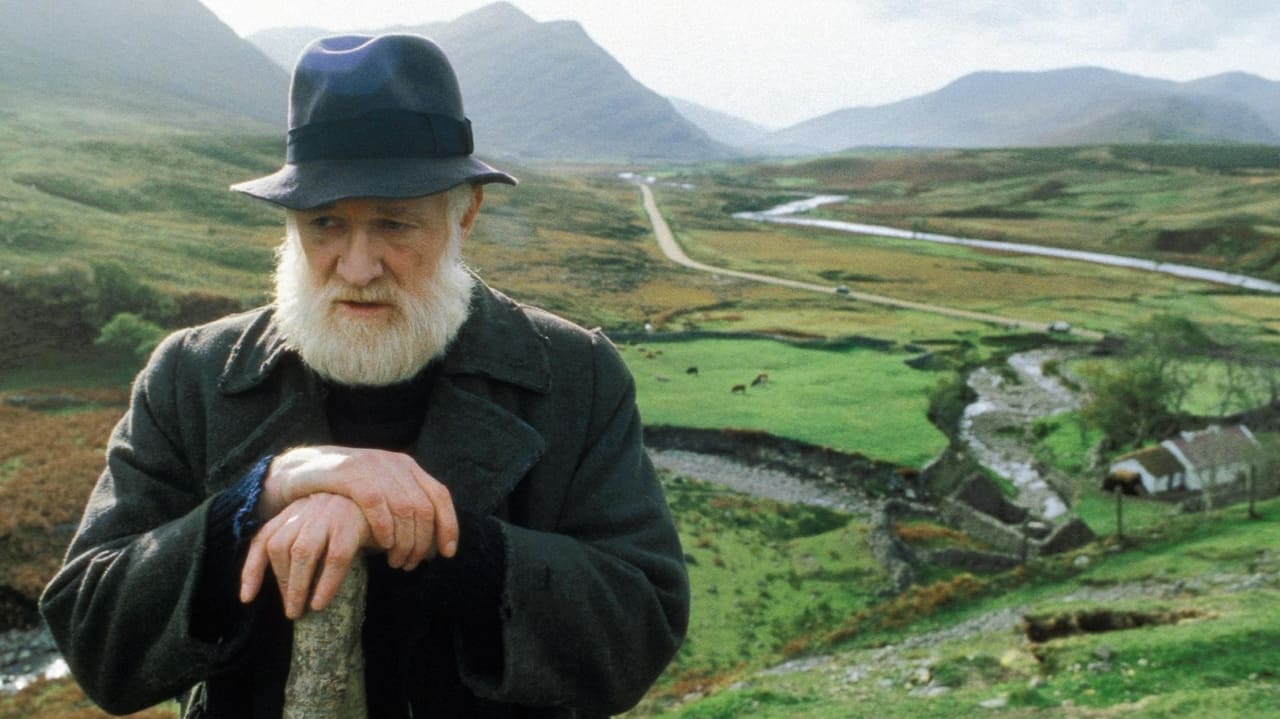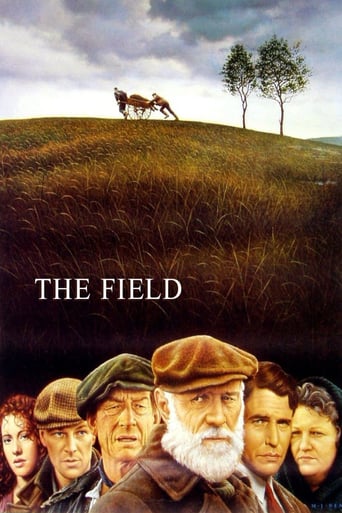



Instead, you get a movie that's enjoyable enough, but leaves you feeling like it could have been much, much more.
View MoreIn other words,this film is a surreal ride.
a film so unique, intoxicating and bizarre that it not only demands another viewing, but is also forgivable as a satirical comedy where the jokes eventually take the back seat.
View MoreWhile it doesn't offer any answers, it both thrills and makes you think.
View MoreThere are irish films that deserve to be watched and there are irish films you should avoid like the plague. The Field is the latter.Richard Harris plays a man who intimidates everyone he meets, he has two sons.. he bullied one until he committed suicide, he is trying to bully the other one into marrying a lady he doesn't even know because she is wealthy, he bullies his wife when she eats dinner. Bull is an odious excuse for a human being.Bull's son spends his nights bullying a defenseless woman. When Bull finds out the lady has been intimidated he acts high and mighty, he condemns what the son did. To hear this coming from a man who bullies people 7 days a week is sickening.When a local piece of land is up for sale he tries to take over the auction in the (false) assumption that everybody else is afraid of him. The local bar owner despises Bull and even tries to get a rise out of him by suggesting an outsider will bid against him.An American starts to bid against Bull, a young man with no shortage of money. This puts Bull over the edge so he begins a campaign of intimidation that will ultimately ends in murder.The local priest wants the community to have a fair auction where anyone can bid without fear. When the priest confronts him Bull tries to deflect his vile behavior by mentioning how corrupt the church was during the famine.It's no secret that director Jim Sheridan and John B Keane had a falling out. John B didn't like how different the film is compared to the play. In Sheridan's defense the play is even worse, in the play Bull McCabe boasts that he beat a donkey to death with his bare fists. Ironically John B Keane's son Billy was on an irish talk show and he said the only part of the the film he didn't like was the animals going off the cliff.
View MoreThe church and the state will steal your property and use it to enslave your neighbours. Praise them and pay them so that they can do this, otherwise you may feel a little bit bad about yourself because some stupid A$$hole told you to.Die so that the machine may build a civilization (an inherently unsustainable and catastrophically destructive series of blocks requiring the importation of resources) where taxation runs around 40% and nobody owns anything due to eminent domain laws. This is so much better than feudalism! I will only pay if you force all of my neighbours to pay as well, that way it's fair!F the world depicted in this movie but f the world we're living in now even more. I'll take 1000000 dead donkies over the life of a good, honest, hard working upstanding man.
View MoreBeing an avid follower of the Oscars ever since the 1984 ceremony has sometimes served to alert me about small movies which had nevertheless obtained at least one major accolade; this powerful Irish drama was just such a case and, appropriately enough, it has taken me all of 18 years to finally watch it! Richard Harris deservedly received his second personal Academy Award nomination (and the film's sole Oscar nod) for his riveting portrayal of an old farmer who is not about to let a visiting Irish-American (Tom Berenger) take away the titular plot of land which he has slaved for years over to breathe new life into. The colorful cast of characters is rounded up by John Hurt (as the mischievous village idiot), Brenda Fricker (as Harris' wife whom he has not spoken to for 18 years, since the accidental death of his son, despite still living under the same roof with her), Sean Bean (as Harris' immature other offspring) and Jenny Conroy (as the sultry village hussy whom Bean eventually takes up with over Harris' objections). The film which opens with the startling donkey disposal incident and closes with the mass suicide of a herd of cows that has tragic consequences is often beautiful to look and has a fine Elmer Bernstein score into the bargain but, truthfully, its real trump card remains, as I mentioned above, Harris' tour-de-force central performance.
View MoreI was surprised that all the critics panned this film as overwrought and overacted. Granted, Richard Harris did seem to be playing King Lear, but if this had been a Japanese or some other foreign film the critics would have been kissing his feet.This is not about the Ireland of Ballykissangel, The Quiet Man, or any film with Barry Fitzgerald patronizing the local pub quaffing stout while quoting witty epigrams. This is the Ireland of unrelenting poverty, generational blood feuds, anger, bitter resentment, and miserable hard scrabble existence, where the most important thing in life is title to one's land. The famine is talked about as if it occurred last year, rather than 80 years before the story is set and the Irish who emigrated are resented by those left behind. Every injustice suffered by the Irish people since time began is remembered and nursed along as if remembrance of past injustice was passed along with the genes. Possible plot spoiler ahead.Bull McCabe is one of those whose family stayed on after the famine to work a tiny patch of barren rocky land which they built up over the years with hard physical labour. We assume that they lost their land during the famine, or perhaps during the time when catholics could not inherit land, even from their father, and they now rent from a widow. the fact that Bull has little time for the church and comments that priests did not starve in the famine, might mean that the family was persecuted for being catholic and lost their land. To Bull, the land is everything and he expects his son to inherit. Bull is a bully, pure and simple and never goes anywhere without his hangers on. No one in the village dare stand up to him, and he expects that his word is law. He wears his grudges like a comfortable cloak, enjoying his misery and hatred of both the English and the Irish who emigrated to America. Unfortunately, his son Tadgh does not share his father's obsession, and retaliates against his father by sneaky underhand tactics such as terrorizing the widow who owns the land, and sneaking off to be with the tinker girl. Even the choice of a wife is being made by his father, more on the basis of how much land she will inherit and whether she will be able to bear children. Considering that Bull has not spoken to his own wife for 18 years, it is doubtful that love might come into the relationship. When an Irish American shows up throwing his money around, with plans to develop the potential of the area, which includes paving over the hard won field, events take a tragic turn as Bull's domination is challenged. Everything Bull and his father and his father before him has worked for is now threatened. It may be easier to understand Bull's obsession is you know how scarce land is in Ireland and how difficult it is to obtain. Much of the land is rocky and unproductive. The famine was not the only reason for the emigration, the fact that the land could not support more than one family at a time, and sometimes not even that. Even the professions were closed to catholics, not that the peasants had the money to educate their children. There was a moving scene in the film where a wake was held for the young people who were emigrating. If you enjoyed "Falling for a Dancer" which had a similar theme, you will like this film, but be warned, while engrossing, it is a very dark and sometimes depressing tale. The performances by the late Richard Harris, Sean Bean and John Hurt are stupendous. It is a great shame that there are not more films of this type for them to show what they can really do.
View More